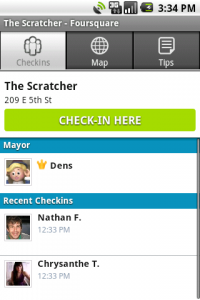If you wish to contribute or participate in the discussions about articles you are invited to contact the Editor
Social Networking: Difference between revisions
Rui.Pereira (talk | contribs) No edit summary |
Rui.Pereira (talk | contribs) No edit summary |
||
| Line 12: | Line 12: | ||
== Application Architecture == | == Application Architecture == | ||
[[File:Venueinfo.png|right|thumb|200px|Check-in in foursquare]] | |||
Social Network applications depend usually on an architecture that includes a user [[Wikipedia:Mobile device|mobile device]] and an information server accessible through the internet. | Social Network applications depend usually on an architecture that includes a user [[Wikipedia:Mobile device|mobile device]] and an information server accessible through the internet. | ||
| Line 31: | Line 33: | ||
== Privacy Issues == | == Privacy Issues == | ||
[[File:Friends2.jpg|right|thumb|500px|Social Networking]] | |||
All social networking applications and sites have privacy issues since users sometimes choose to share information that might be used for other purposes than those initially intended. In the case of location based social network this can be even more critical since the information about the user location can be shared to all its friends, to all the users of the application and sometimes is made public to everyone in the internet<ref name="Soc_Net">[[Wikipedia:Social_Networking|Social Networking in Wikipedia]]</ref>. | All social networking applications and sites have privacy issues since users sometimes choose to share information that might be used for other purposes than those initially intended. In the case of location based social network this can be even more critical since the information about the user location can be shared to all its friends, to all the users of the application and sometimes is made public to everyone in the internet<ref name="Soc_Net">[[Wikipedia:Social_Networking|Social Networking in Wikipedia]]</ref>. | ||
Revision as of 02:18, 9 April 2011
| Applications | |
|---|---|
| Title | Social Networking |
| Author(s) | Rui Barradas Pereira. |
| Level | Basic |
| Year of Publication | 2011 |
Social Networking has become a part of our daily life and millions of cybernauts use social network to interact with their social and professional contacts. The concept of posting information about "what are you doing" very rapidly progressed to post "where are you".
Location-enabled Social Networking allows users to post their current location or to check into[nb 1] places or venues. This allows the user to disseminate his/her location to his/her friends while receiving the information of who is in the same vicinities.
Application Architecture
Social Network applications depend usually on an architecture that includes a user mobile device and an information server accessible through the internet.
The user mobile device is usually a mobile phone with internet access, localization capabilities and a multimedia interface running the social networking application.
There are two modes of operation for these applications:
- The application periodically sends automatically the user position to a server. The user's location is available to his/her friends in the social network.
- The user posts its position by posting its coordinates or by checking in nearby locations or venues. The user location is available to his/her friends and the list of other users present at the location is also available to the user.
Variants to these modes are:
- Some location based social networks are directed specifically to dating; the user defines a set compatibility parameters and the server returns compatible candidates who are in the vicinity of the user[1].
- Some of these applications allow users to chat with other users in the vicinity.
- In some networks all users are visible to each other, but in most cases there are privacy options that determine who can access other users’ location.
- Some of the applications integrate with Twitter or Facebook by posting the user location in these social networks.
These applications are considered non-critical applications.
The accuracy required by these applications is low, being the current accuracy provided by civilian GPS enough.
Privacy Issues
All social networking applications and sites have privacy issues since users sometimes choose to share information that might be used for other purposes than those initially intended. In the case of location based social network this can be even more critical since the information about the user location can be shared to all its friends, to all the users of the application and sometimes is made public to everyone in the internet[2].
The information about the user location can be used by others to know where the where the user home is, and whether he is at home or not. This information can be used to commit crimes such as such as burglary or stalking[3].
When using these services the user should take into consideration the level of privacy that the service provides and who will have access to the user location. These security concerns lead to the existence of sites such as Please Rob Me, which intend to raise awareness about the consequences of revealing too much information[4].
Application Examples
Example of location-based social networks[2]:
- foursquare: Allows to check in on location, share information about the location and to know where your friends are.
- Gowalla: Allows to check in on location, share information about the location and to know where your friends are.
- Facebook: Facebook Places provides check in functionality in Facebook.
- Google Latitude: Google service that allows the user to share its location with selected users.
- Twitter: The Twitter API allows to add latitude and longitude information to every twit.
Notes
- ^ In Location-enabled Social Networks the term check-in is often used to refer to the act of posting that the user is in a place or venue
References
- ^ The past, present, and future of location-based mobile social networking Ross Dawson, September 2008.
- ^ a b Social Networking in Wikipedia
- ^ Geotags and Location-Based Social Networking, US Army
- ^ foursquare (social network) in Wikipedia


